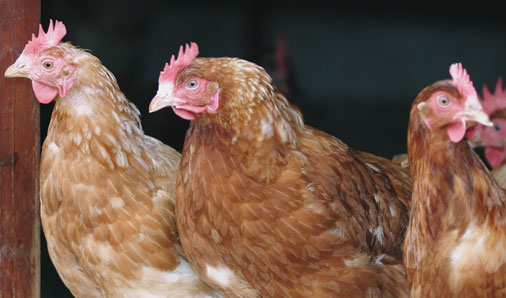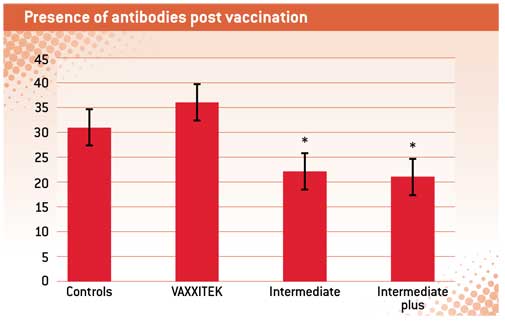Wider benefits from early vaccination of chickens

Vaccinating to protect the chicken’s immune system can improve the immune response of other vaccinations, as Poultry World reports
It has been known for some time that treating chickens with one vaccine to help protect its immune system can also improve its immune response to other vaccines.
But recently-published research has shown that some products work better than others in this respect.
The research was conducted by Merial Animal Health’s avian technical director Francesco Prandini, using the company’s hatchery vaccine VAXXITEK® HVT+IBD, which is designed to protect against Marek’s disease and infectious bursal disease.
He looked at the effects of vaccination with this product on commercial layer pullets, compared with two modified live Gumboro (IBD) vaccines that traditionally are administered on farm to birds in rear.
The trial
A total of 160 commercial brown pullets were split into four groups of 40 birds and reared in isolation rooms from day-old to 10 weeks of age.
- Group 1 was vaccinated with VAXXITEK® HVT+IBD by subcutaneous injection at day old.
- Group 2 was orally vaccinated with an intermediate IBD modified live vaccine at 28 days.
- Group 3 was eye-drop vaccinated with an “intermediate plus” IBD modified live vaccine at 28 days.
- Group 4 was not vaccinated against IBD at all, acting as a control group.
The four groups were then subjected to a fairly standard vaccination programme as might apply in any commercial environment, to see how their immune responses differed.
All the layer pullets received a Rispens vaccine by subcutaneous injection at day old to protect against Marek’s. They also received a dose of H120 (a Massachusetts-type vaccine) against infectious bronchitis, and Avinew® against Newcastle disease.
At day 14, all groups were then vaccinated with the IB 793B variant vaccine Gallivac® IB88 by eye drop, and at day 21 they all received a second Avinew® vaccination.
The study was terminated at 70 days post hatch, when the bursa and bodyweight ratios were determined, to ascertain how the birds had responded to the various vaccines and therefore, how effective they might be at fending off disease.
Results
Pullets initially vaccinated with VAXXITEK® HVT+IBD showed significantly higher bursa to bodyweight ratios than the other groups of the study, suggesting they had healthier bursas that would be producing more antibodies.
This was borne out by analysis of blood samples, which were taken on days 28, 42 and 70 of the trial. Flow cytometric analysis was used to assess the relative number of B lymphocytes in the blood – effectively measuring the circulating antibodies in the bird (see graph).

“Pullets vaccinated with VAXXITEK® HVT+IBD did not show any depression of the number of circulating B cells, but pullets vaccinated with modified live IBD vaccines saw a significant reduction of these antibodies,” said avian manager for Merial, Helen Houghton.
Further blood tests were carried out at 70 days to look at antibody titres for infectious bronchitis, egg drop syndrome and Newcastle disease.
“Antibody levels against these diseases were significantly lower in the groups vaccinated with modified live IBD vaccines compared with the VAXXITEK® HVT+IBD group,” says Mrs Houghton. “It is possible that the modified live IBD vaccines may have affected the humoral immune response of the pullets vaccinated.
“The research suggests that early vaccination against immunosuppressive diseases such as Gumboro and Marek’s can help to protect a chicken’s immune system. This enables a bird to respond better to other vaccinations and against the other pathogens it meets in life, helping to improve overall bird health.”
